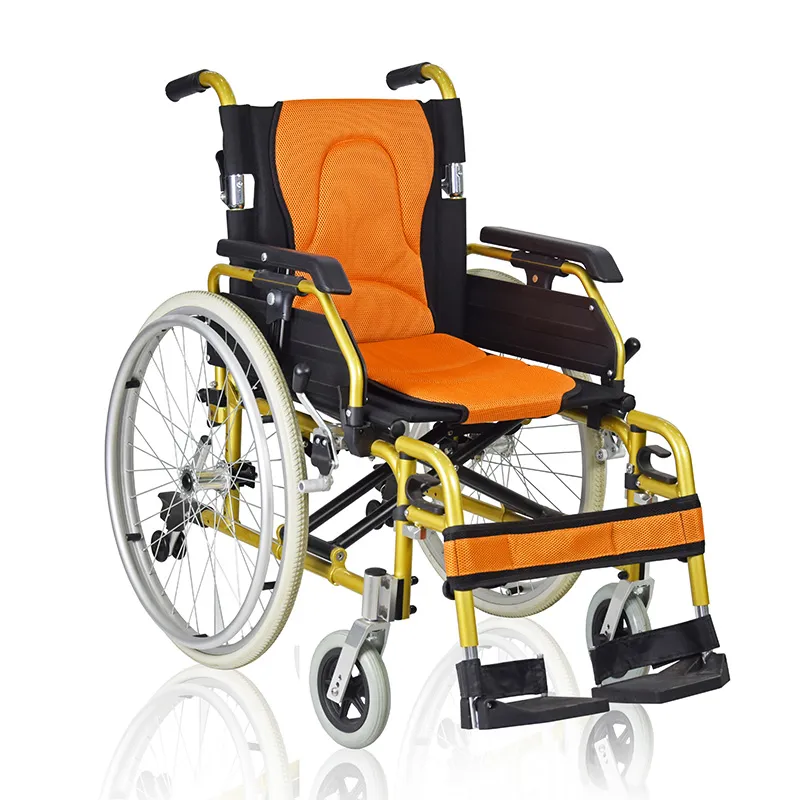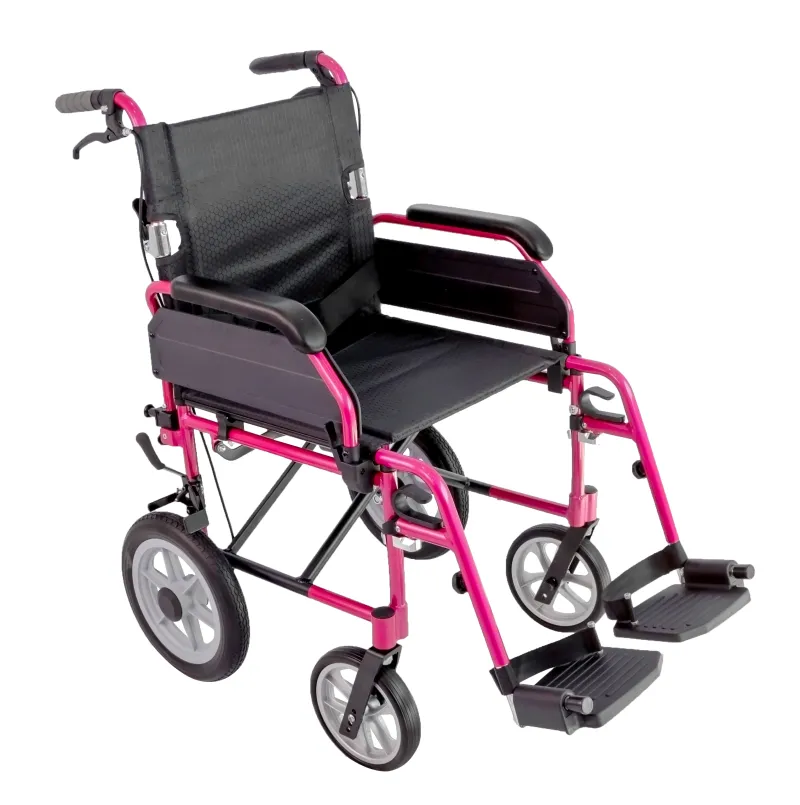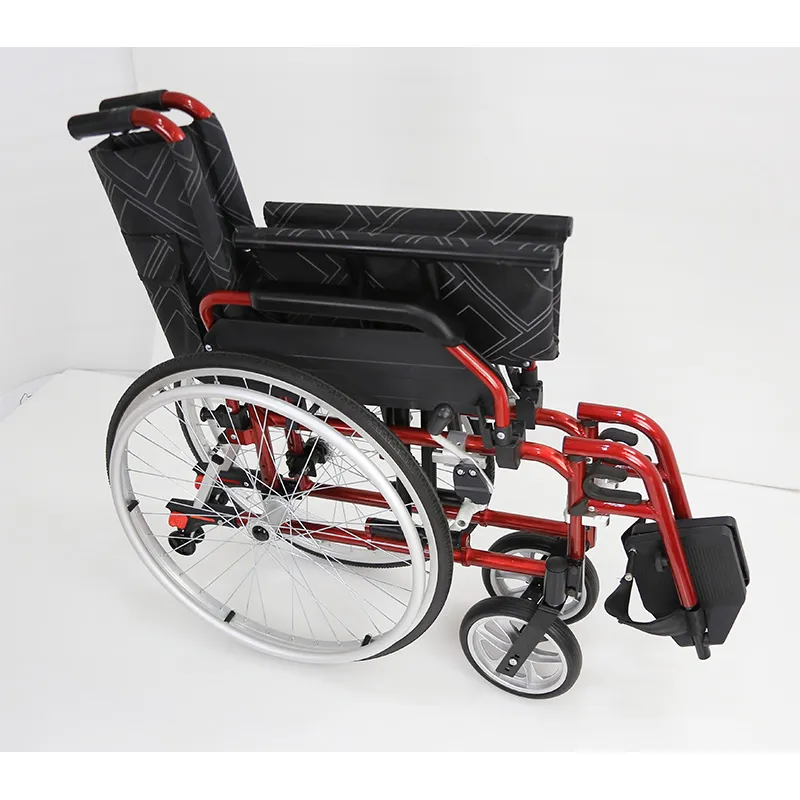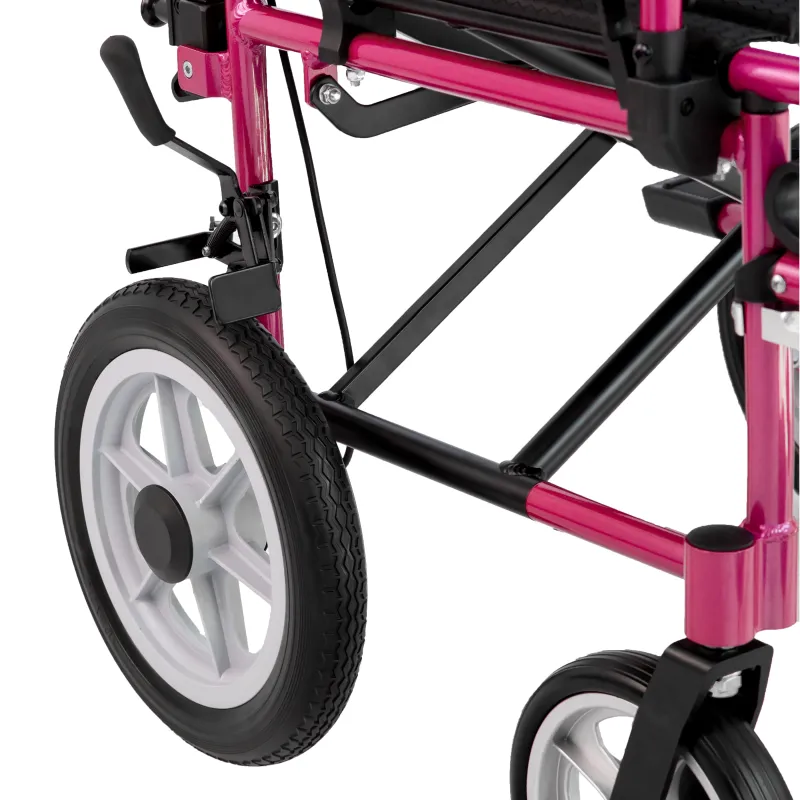
Is it better to have a large wheel or a small wheel for an aluminum wheelchair?
2024-09-05 15:30
As an important auxiliary device, wheelchairs provide great convenience for people with limited mobility. In recent years, aluminum wheelchairs have been widely welcomed for their lightness and durability. However, when choosing an aluminum wheelchair, a common question is whether to choose a large wheel or a small wheel. This is not only related to the user's comfort, but also affects the applicable scenarios and ease of operation of the wheelchair.
This article will explore the advantages and disadvantages of large wheels and small wheels of aluminum wheelchairs from multiple angles to help readers make a wise choice.

What are the advantages of a large-wheel wheelchair?
Advantages of a large-wheel wheelchair: strong obstacle crossing ability, high comfort (reducing discomfort caused by bumps on the road), and easier to push (with a larger diameter, less torque required when pushing).
1. Strong obstacle crossing ability:
Aluminum wheelchairs with large wheels usually have stronger obstacle crossing ability and can easily cross small obstacles such as thresholds, stones and grass. This makes large-wheel wheelchairs perform better when used outdoors and can adapt to various complex terrain environments.
2. High comfort:
Large-wheeled wheelchairs can provide better shock absorption during driving, reducing the discomfort caused by bumps on the road. This is especially important for users who rely on wheelchairs for a long time, and can significantly improve their comfort.
3. Easier to push:
Because large wheels have a larger diameter, the torque required for pushing is smaller, so it is relatively easy to push. This is an important advantage for users with weak upper limb strength, allowing them to operate the wheelchair more easily.

What are the disadvantages of large-wheeled wheelchairs?
Disadvantages of large-wheeled wheelchairs: large size (may not be convenient when used in a small space), heavy weight (affecting the portability of the wheelchair).
1. Large size:
Aluminum wheelchairs with large wheels are usually large in size and may not be convenient to use in a small space. For example, when moving indoors or in a narrow corridor, they may be subject to certain restrictions.
2. Heavy weight:
Although aluminum wheelchairs are light in themselves, the design of large wheels increases the overall weight. This may affect the portability of the wheelchair, especially when it needs to be frequently carried or folded for storage.
Who are large-wheeled wheelchairs suitable for?
Large-wheeled wheelchairs are suitable for users who often go outdoors or need to cross various terrains, especially those who live in rural or suburban areas with complex surrounding environments. In addition, large-wheeled wheelchairs can also provide better comfort and ease of operation for users with weak upper limb strength or who need to use wheelchairs for a long time.
What are the advantages of small-wheeled wheelchairs?
Advantages of small-wheeled wheelchairs: high flexibility (can easily turn and move in a small space), strong portability (easy to fold and carry), and low price.
1. High flexibility:
Aluminum wheelchairs with small wheels have high flexibility and can easily turn and move in a small space. This makes small-wheeled wheelchairs perform well when used indoors and are suitable for use in environments such as homes, offices or hospitals.
2. Strong portability:
Due to the design of small wheels, the overall weight of aluminum wheelchairs is lighter and smaller in size. This makes small-wheeled wheelchairs easier to fold and carry, making them convenient for storage or travel when not in use.
3. Lower price:
Generally speaking, aluminum wheelchairs with small wheels are relatively cheap and are an affordable choice for users with limited budgets.
What are the disadvantages of small wheel wheelchairs?
Disadvantages of small wheel wheelchairs: poor obstacle crossing ability (easy to be stuck by small stones, thresholds, etc.), low comfort (on uneven roads, you will feel more bumps and discomfort).
1. Poor obstacle crossing ability:
Aluminum wheelchairs with small wheels do not perform as well as large wheels when crossing obstacles, and are easily stuck by small stones, thresholds, etc. This limits the applicability of small wheel wheelchairs in complex outdoor terrain.
2. Low comfort:
Due to the small wheel diameter, the shock absorption effect is poor during driving, and users may feel more bumps and discomfort, especially on uneven roads.

Who are small wheel wheelchairs suitable for?
Small wheel wheelchairs are suitable for people who mainly move indoors or live in cities with a relatively flat surrounding environment. In addition, small wheel wheelchairs are also a good choice for users who need to move wheelchairs frequently or have limited budgets.
Comprehensive comparison of large-wheeled wheelchairs and small-wheeled wheelchairs
1. Scenario applicability: Large-wheeled wheelchairs perform better outdoors and are suitable for use on complex terrains such as grass and gravel roads, while small-wheeled wheelchairs perform better indoors or on flat urban roads.
2. Convenience of operation: Large-wheeled wheelchairs are suitable for users with weak upper limb strength due to their easy pushing, while small-wheeled wheelchairs are suitable for users who need to turn frequently in a small space due to their high flexibility.
3. Portability: Small-wheeled wheelchairs have obvious advantages in portability, with light weight and small size, making them easy to fold and carry. Although large-wheeled wheelchairs have strong obstacle-crossing capabilities, they are slightly less portable due to their size and weight.
4. Comfort: Large-wheeled wheelchairs provide better shock absorption and are suitable for users who need to use wheelchairs for a long time. Small-wheeled wheelchairs may cause more discomfort on uneven roads.

User feedback
Large-wheeled wheelchair user:
Mr. Li, 65 years old, lives in the suburbs and often walks in nearby parks and country roads. He said that since using the large-wheel aluminum wheelchair, traveling has become more convenient, even on gravel roads and grass, he can easily pass through. The design of the large wheels makes him feel more stable during driving and very easy to push.
Small-wheel wheelchair users:
Ms. Wang, 70 years old, lives in an urban apartment building and mainly moves around at home and nearby supermarkets. She thinks that the small-wheel aluminum wheelchair is very suitable for her needs. It is not only light and easy to push, but also can easily turn in narrow corridors and elevators. Although it is a little bumpy on uneven roads, overall, she is very satisfied with the portability and flexibility of the small-wheel wheelchair.
Summary
Large-wheel and small-wheel aluminum wheelchairs each have their own advantages and disadvantages and scope of application. Large-wheel wheelchairs are suitable for users who need strong obstacle crossing ability and high comfort, while small-wheel wheelchairs are more suitable for users who move in small spaces and pursue portability and flexibility. When choosing, you should consider your actual needs, living environment and budget.








